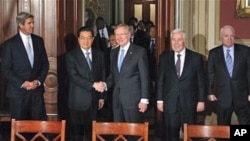Chinese President Hu Jintao has faced his critics in the U.S. Congress for talks on human rights, economic policy and North Korea.
House speaker John Boehner said he and his colleagues raised their "strong, ongoing concerns" of reports of human rights violations in China, including the denial of religious freedom, and the use of coercive abortion as a consequence of the "one child" policy.
He said "curtailing the aggressive behavior of North Korea" was also on the agenda.
Related video report by Mil Arcega
Members of the U.S. Congress have expressed anger about China's human rights record and its currency policies that many lawmakers believe are taking away American jobs. Mr. Hu met with House lawmakers before moving on to the Senate.
Boehner said he hopes dialogue with China on the issues will continue.
On Wednesday, Mr. Hu was the guest of honor at the White House, where he and President Barack Obama held talks on a wide range of issues, including human rights, North Korea and China's economic policies. Mr. Obama said he reaffirmed America's fundamental commitment to the universal rights of all people.
Boehner and Senate Majority Leader Harry Reid turned down invitations to attend a black-tie White House dinner for Mr. Hu. Both lawmakers said they were simply waiting to meet with him Thursday. But anger is running high in the Congress over China. Reid called Mr. Hu a "dictator" during a television interview this week, but then said he regretted the remark.
Mr. Hu made a rare concession on the rights issue Wednesday during a joint news conference with Mr. Obama. After the U.S. president publicly called for China to uphold universal rights, Mr. Hu conceded that "a lot" must still be done to improve human rights in his country.
Mr. Hu is also delivering what China has billed as a "major address" to a U.S. business forum before traveling to Chicago, America's third largest city. In Chicago, he will highlight cultural contacts between the countries and attend a contract-signing ceremony.
Another source of friction between the United States and China is the currency issue, as legislation has already been introduced in the U.S. Congress calling for tariffs on Chinese imports if Beijing continues to keep the value of the yuan artificially low.
Mr. Obama said Wednesday a higher yuan would help address the huge trade imbalance between the two nations.
Some information for this report was provided by AP, AFP and Reuters.




